Arts & Entertainment
On the rise
All-girl lesbian rock band set to play Jammin’ Java this weekend
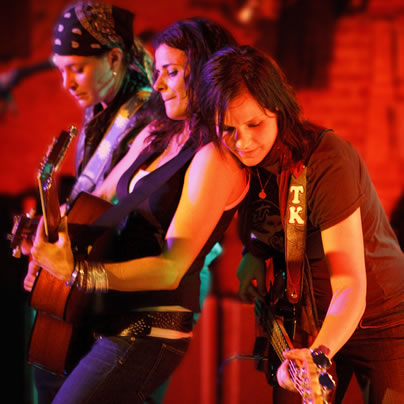
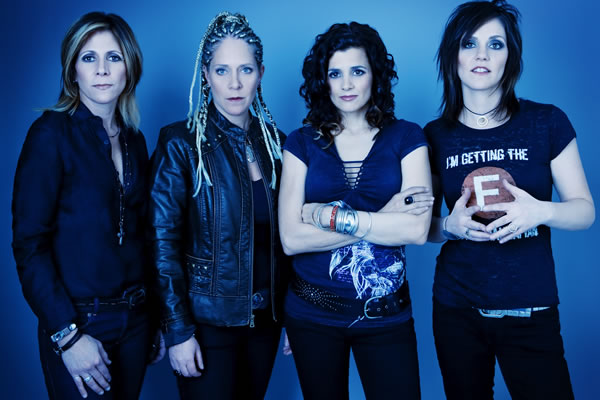
Antigone Rising is, from left, Dena Tauriello, Cathy Henderson, Nini Camps and Kristen Ellis-Henderson. (Photo by Anthony St. James)
Antigone Rising with Mama’s Black Sheep
Jammin’ Java
Saturday
Doors at 5 p.m.; show at 6
Tickets: $15 ($18 at the door)
227 Maple Ave. E
Vienna, Va.
Jamminjava.com
Antigonerising.com
It’s been a good year for Antigone Rising.
The all-girl country/rock band got strong video play on CMT with current single “That Was the Whiskey” and founding member Kristen Ellis-Henderson made the April 8 cover of Time magazine for the lesbian version of its controversial “Gay Marriage Already Won” issue with her wife, Sarah Kate Ellis-Henderson.
The band — all lesbians in the current lineup — plays Vienna’s Jammin’ Java Saturday night. We spoke with Ellis-Henderson by phone two weeks ago from her home in Sea Cliff, N.Y. Her comments have been slightly edited for length.
WASHINGTON BLADE: The band has such great vocal harmony. How integral is working out the harmony parts when constructing the song as a whole?
KRISTEN ELLIS-HENDERSON: It depends. We’ve been doing it so long now that a lot of times we just kind of fall into a certain role. But very often when we’re writing melodically, we’re also thinking about the harmonies too. We often say if we have to work too hard or think too hard about it, we must be going about it the wrong way. Often we’ll just go with what flows the most naturally. This has been a philosophy that has held true in other areas of our career as well. Certain songs will just click faster and every once in awhile we have to really push for something but often they’re the ones that aren’t really well received. We’ve just found that to be a kind of rule almost.
BLADE: Do you all write?
ELLIS-HENDERSON: (Lead singer) Nini (Camps) and I are the primary songwriters but we’re a band so we all have a part in it. Again, we’ve been together so long now, I almost know instinctually what Cathy (Henderson, Ellis-Henderson’s sister) and (drummer) Dena (Tauriello) will bring to it. But yes, technically Nini and I hole up in a room, then we bring it to the band and the band takes it to the next level.
BLADE: By now we’ve seen out singers be out in every way possible from coming out late in their careers, being out right from the start and every step in between. How calculated was the handling of that early on in the band?
ELLIS-HENDERSON: In the earlier part of our career, we were often methodical about trying to keep it on the inside. I never was comfortable with trying to keep it quiet because we’d always played gay bars and anybody who paid attention knew it. But there were some in the band at the time who felt in the ‘90s, that it would be pigeonholing ourselves to be more out. We had some straight people in the band at the time and some members who felt pretty strong about that. I never really felt that way and I always knew our strongest support came from the lesbian and gay community. Then over time, the band has shifted members. I started a family and have a wife and kids so I can’t really live my life in the closet. We say now the music and the band are pretty much an open book. We’re here, we’re gay and we’re proud and we feel that goes hand in hand with being in a band. I know there are some artists who feel differently and that’s fine. Everybody has their own approach. Some feel it’s not their place to try to change hearts and minds but I feel we have a bigger role and that’s something we can all contribute to.
BLADE: So it just kind of worked out that all the current members are lesbians?
ELLIS-HENDERSON: Nini has been with us since 2008 but Cathy and Dena and I have been together almost 20 years. Cathy and I started the band and maybe five years after that, Dena joined us and has been with us about 15 years. Nini and I were always writing together and she toured with us some and was like an honorary member in some ways for a long time, back when we did some shows with the Bangles. But she’s been officially with us about five years.
BLADE: “That Was the Whiskey” got some strong attention this year. Was that from an album or is it slated to be on one?
ELLIS-HENDERSON: It wasn’t and here’s the thing — and we are literally still in talks about this — but we are discussing whether we want to ever release another album. We’re seriously thinking about just offering a different download every other month and kind of making that our business model. … Even with big acts like Miley Cyrus and Katy Perry who are on these huge major labels, they have these huge hits that everybody downloads and it’s like nobody even cares anymore about the rest of the album. I mean that’s what the numbers are really showing. The whole industry is in disarray so we’re thinking of changing our business model and thinking this could be something we could be really successful at — just going one song at a time and make each one an event.
BLADE: But isn’t there something creatively satisfying with a longer-form artistic statement, both for yourselves and for the hardcore fans who do want something to sink their teeth into?
ELLIS-HENDERSON: I understand what you’re saying, but it’s just an art form that’s practically non-existent anymore. I can feel that way as an artist but I have to be realistic too and that’s just the way music is being consumed. I am one of those people who likes to ooh and aah over a tangible product so we’re thinking about the end of the year, maybe putting out an EP of that year’s songs. We’ve always had a slightly different business model, though. We record our shows and sell them and it’s just different from the Katy Perrys of the world and these huge artists. Yes, I could sit here and lament the death of the record album and CD and I do, but at the same time — I mean even with me, there are only a handful of artists, Shawn Colvin for one, who I want to hear start to finish. I don’t really care about Katy Perry’s full album. I want her singles though. … I think this could be a more interesting way to go than disappearing off the face of the earth for two years.
BLADE: How rigid have you found the lines to be in various markets? It strikes me as pretty cool that CMT would play your video.
ELLIS-HENDERSON: Yeah, I find it kind of shocking. Nashville as a rule is still pretty closeted. There are certain artists there whom I know are gay who will intentionally not join us for dinner out there or they just never seem to be able to make it to our show when we’re in town. There are others who support us wholeheartedly but Nashville is definitely about 25 years behind New York and L.A. and even D.C., you know the more forward markets. Even Atlanta is more progressive than Nashville. I kinda love the contradiction. Here’s this really rowdy band and a song about whiskey but in the video, she leaves with a guy and a girl. I love pushing that boundary. I think it’s changing too. We have people like Kacey Musgraves singing her song about “make lots of noise/kiss lots of boys/or kiss lots of girls if that’s something you’re into.” GLAAD Tweeted about it. It literally gave me chills to see her on the CMAs singing that to the whole country community. I think the fact that she’s not gay actually helps. It’s one inch closer.
BLADE: Is your show at Jammin’ Java part of a larger tour or do you just go out here and there?
ELLIS-HENDERSON: We’re kind of on perpetual tour. It goes in spurts. We’re raising families, which is really contradictory to the rock and roll lifestyle, so we’re always going out in little fits and spurts. We’ll do some holiday-themed shows since it’s December.
BLADE: Is this show part of that?
ELLIS-HENDERSON: Yeah. We have a new Christmas single and we’ll definitely two or three other Christmas songs too. We’ll give the show a little Christmas twist.
BLADE: How long is your show on average?
ELLIS-HENDERSON: We do about 80 minutes and play maybe 18-20 songs. We’re a live band so we’re always a little spontaneous. It’s always a slightly different show.
BLADE: Does Cathy braid her own hair?
ELLIS-HENDERSON: She doesn’t. She’s got this woman, Nancy, who’s been doing it forever. If we’re going out, she needs like eight hours the day before to get her hair braided. In a pinch or like on really long tours, I’ve done it and oh my God, it is a process. I’m always thinking, “Just get dreads already.” If I have to do it, she just gets six or seven big rows. That’s all I have the brainpower to be able to handle.
BLADE: If you had to guess, what percentage of the people who come to your shows are LGBT?
ELLIS-HENDERSON: It’s so hard to say. I kind of always assume they’re gay. I’m like, “Oh my God, you look gay to me.” I would guess about 60 percent are LGBT. In some ways it seems more mixed than ever. But we have a large gay following and I love it. We’ve always had that support. Even when we were just a tiny little indie band we’d be out in these random markets, these little college towns, and we’d have clubs willing to book us on a Tuesday night because there was never a room that there weren’t 10 or 15 young lesbians who traveled to see us. That’s the great thing about the gay community, we support each other. Then we’d have people say, “Wow, you got a little crowd even on a weeknight, we’ll have you back” and the next time those 10 or 15 would bring a few more so there’d be 15 or 20 more and we’d have 50. We’re so grateful for that support.
BLADE: But do you ever fear that that ends up becoming the band’s whole shtick, or at least that some will have the perception that that’s all you’re about?
ELLIS-HENDERSON: Not for me. I find it a blessing and an honor to talk about it and maybe be a role model or an advocate. I love talking about activism, that’s why I blog. It’s a passion.
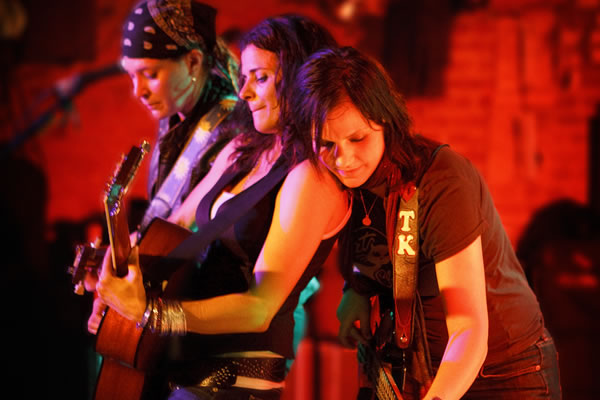
Antigone Rising live. (Courtesy photo)
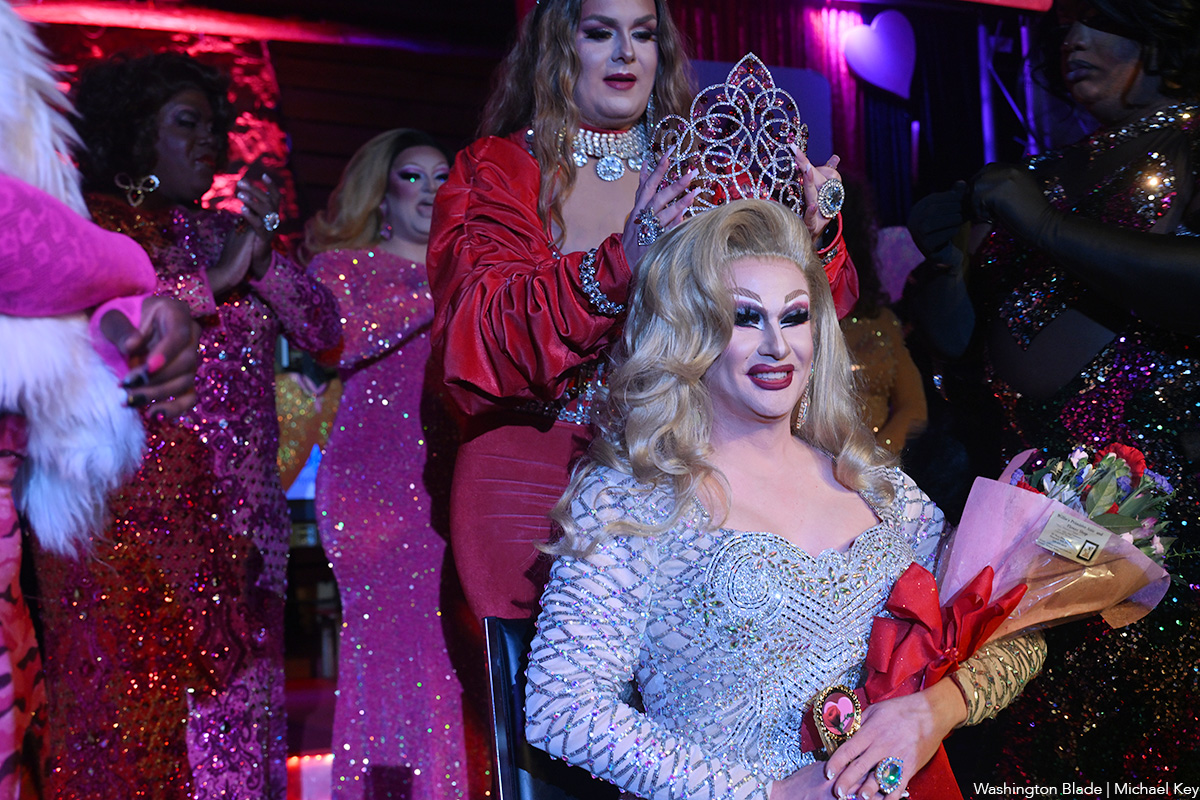
The 44th annual Queen of Hearts pageant was held at The Lodge in Boonsboro, Md. on Friday, Feb. 20. Six contestants vied for the title and Bev was crowned the winner.
(Washington Blade photos by Michael Key)
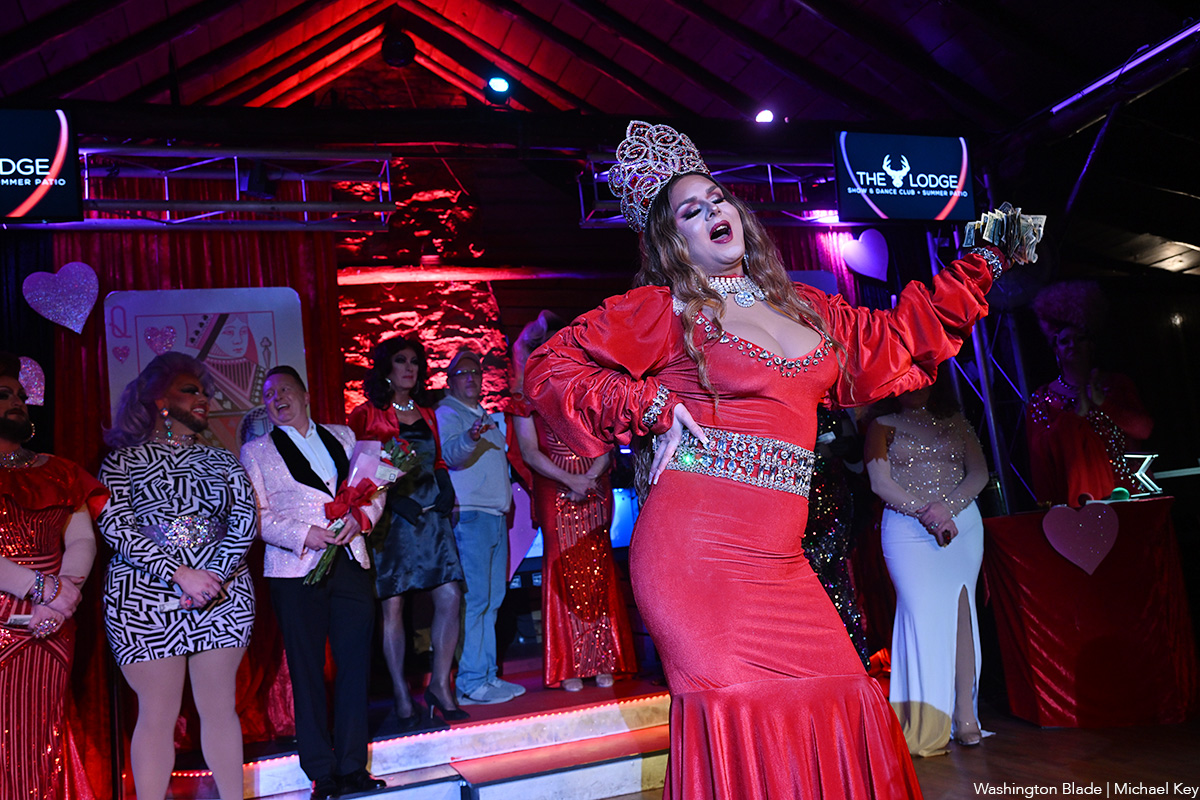
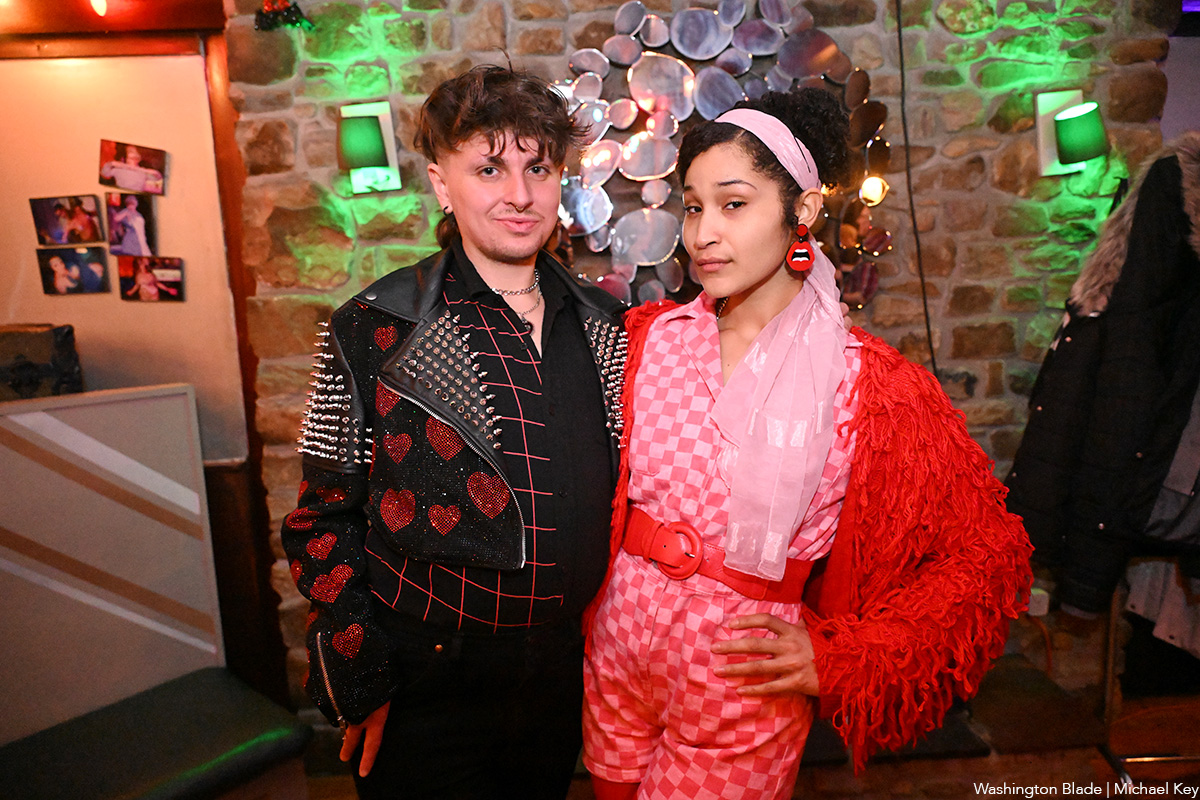
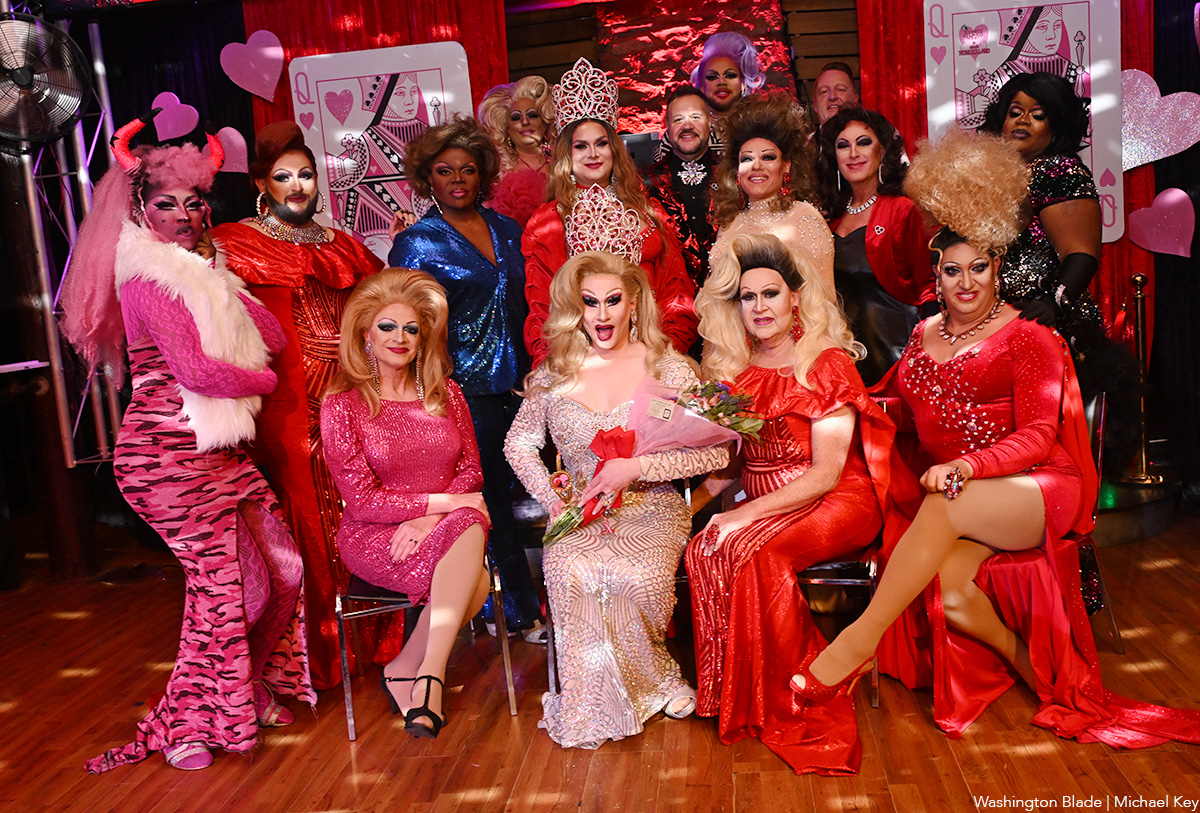
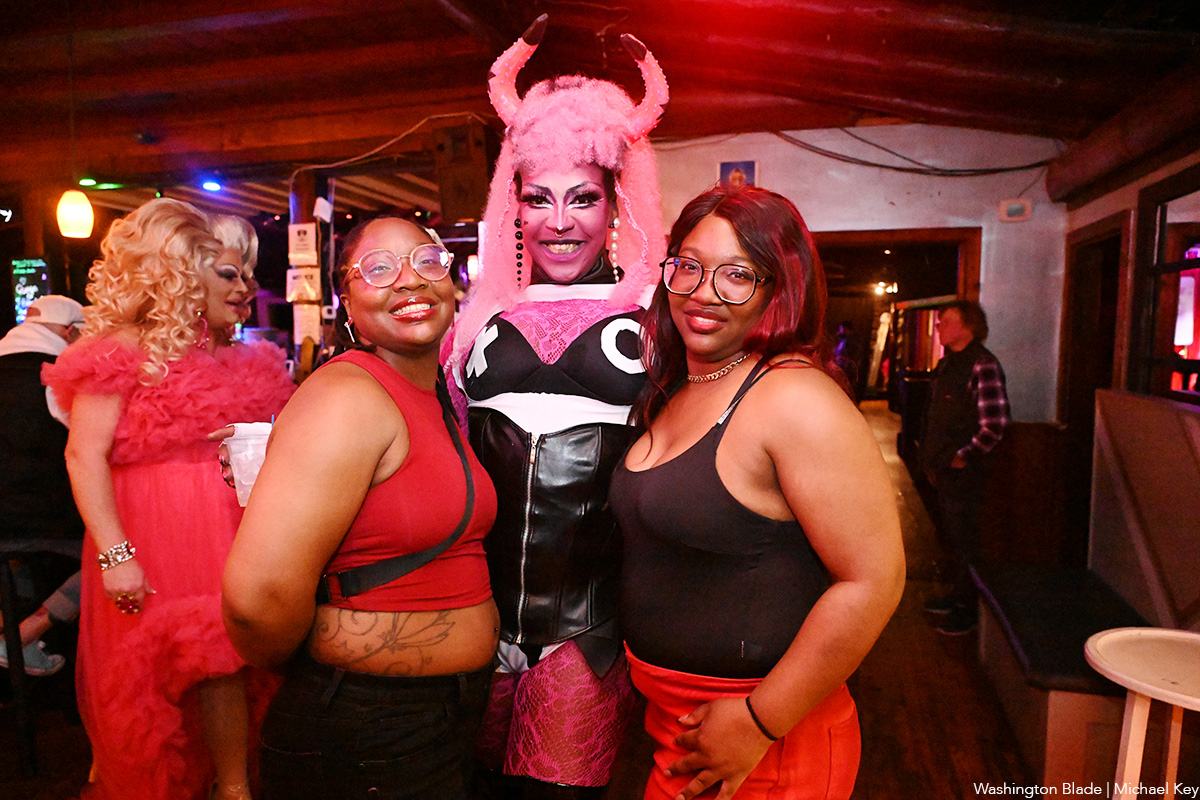
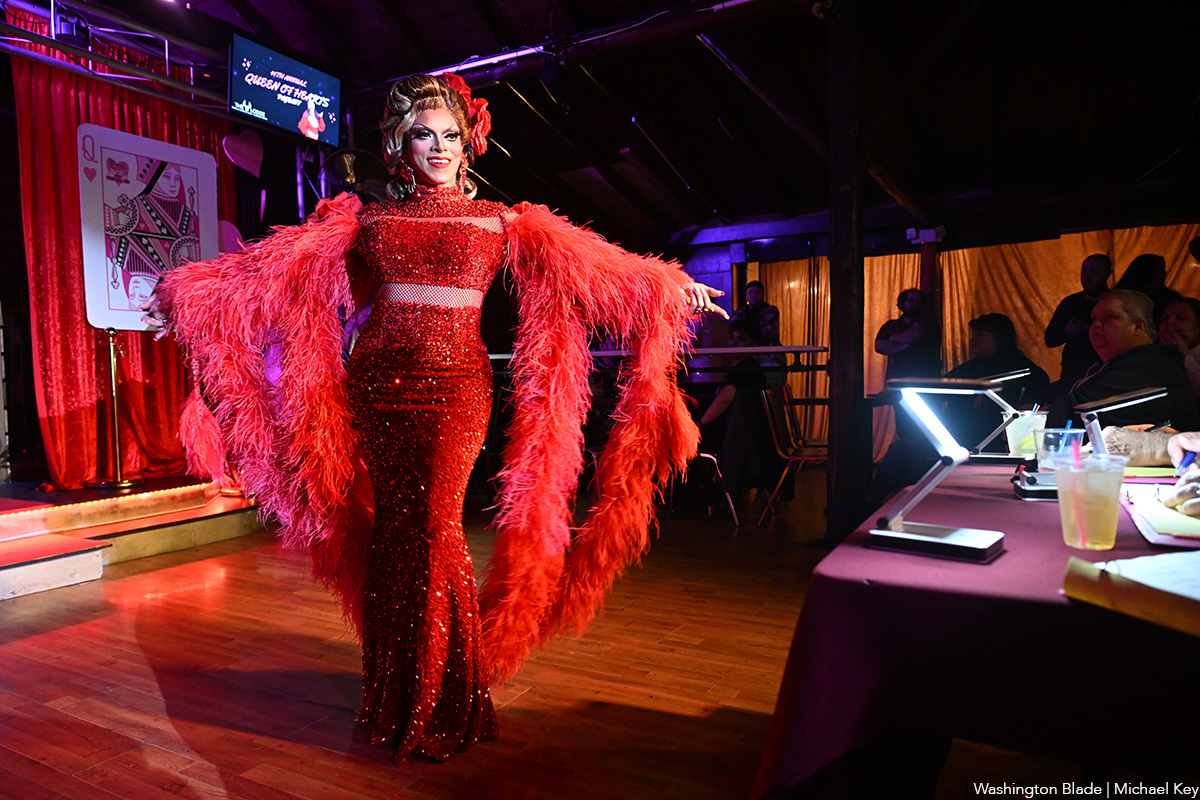
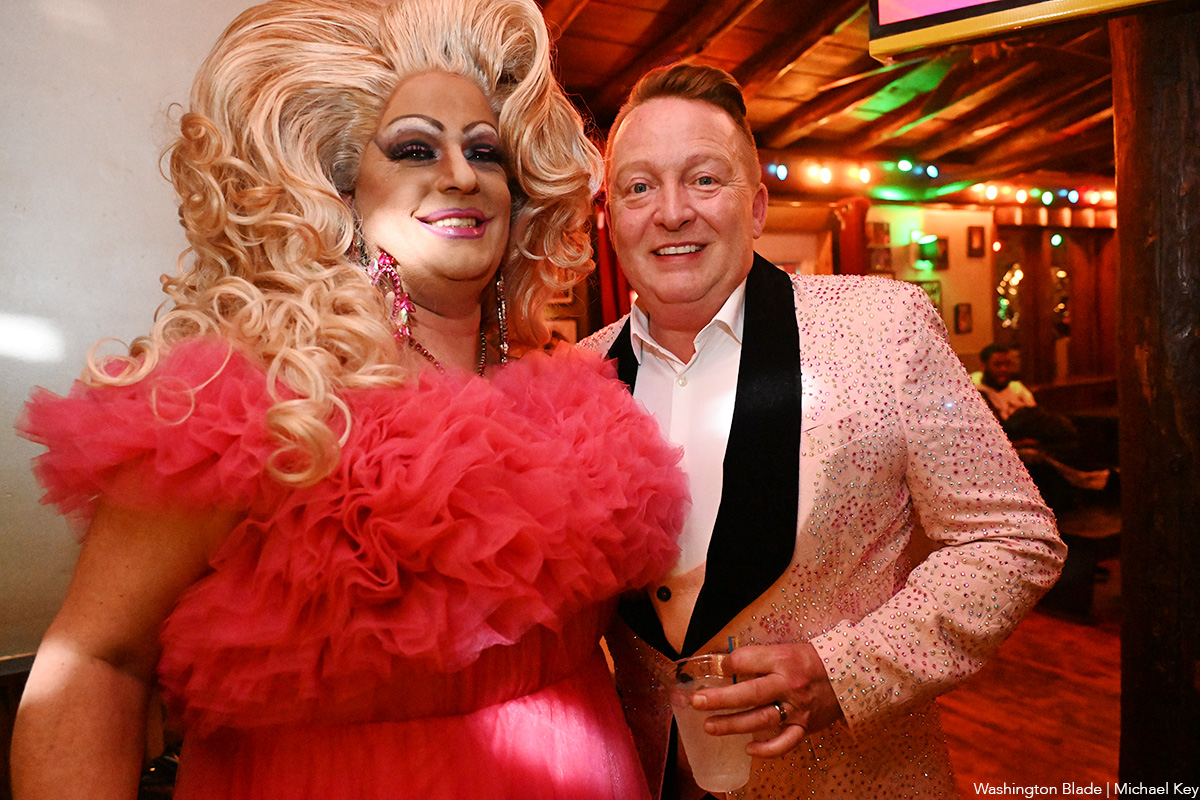
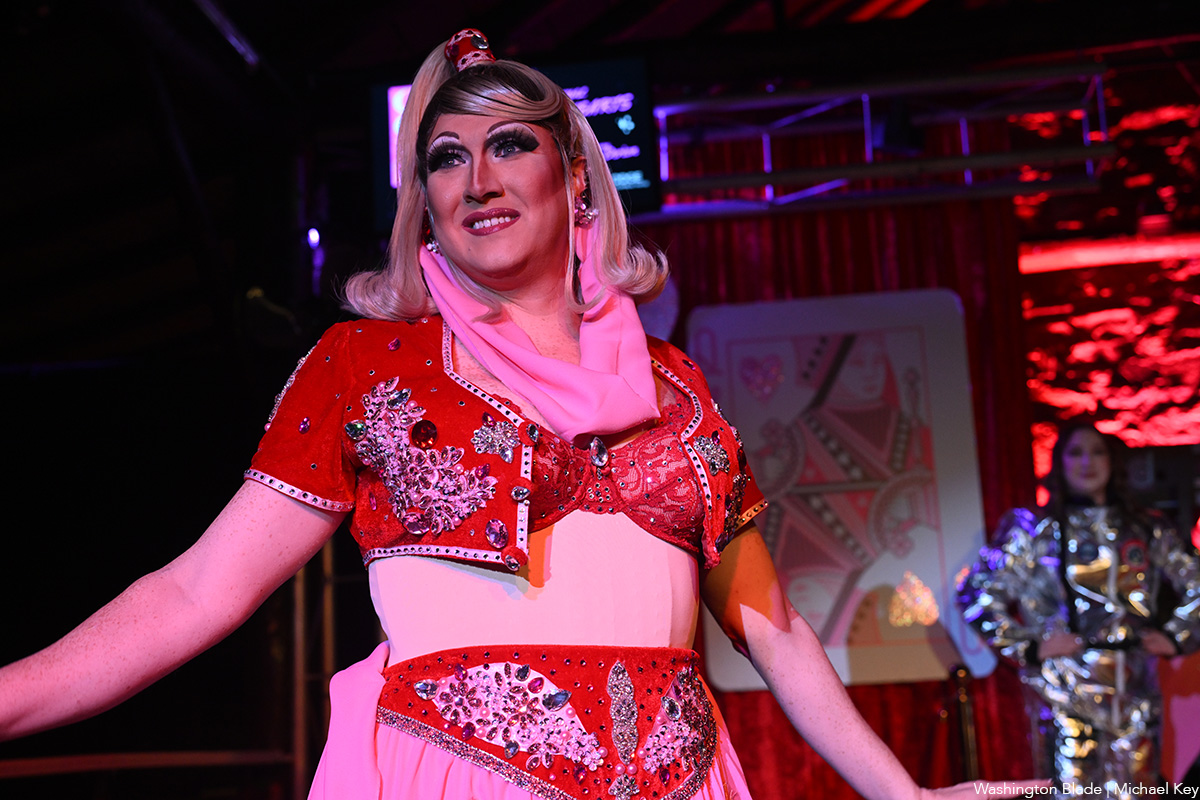
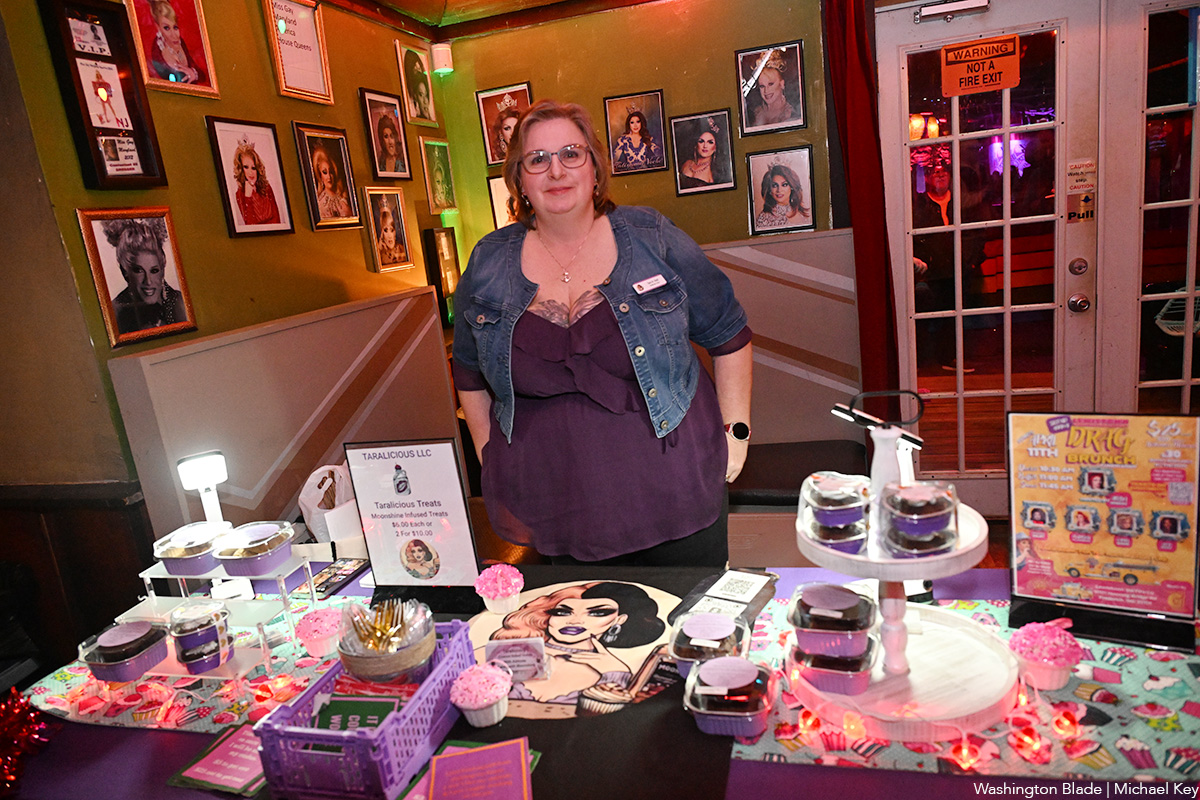
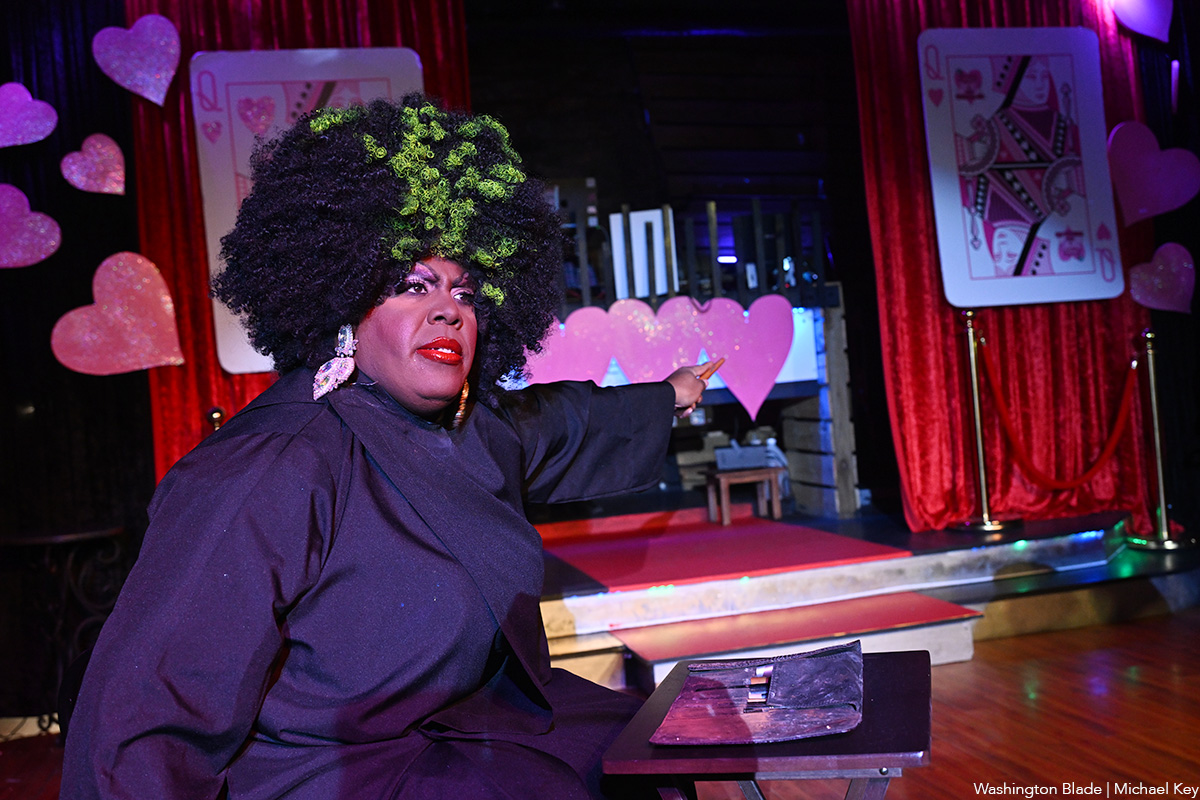
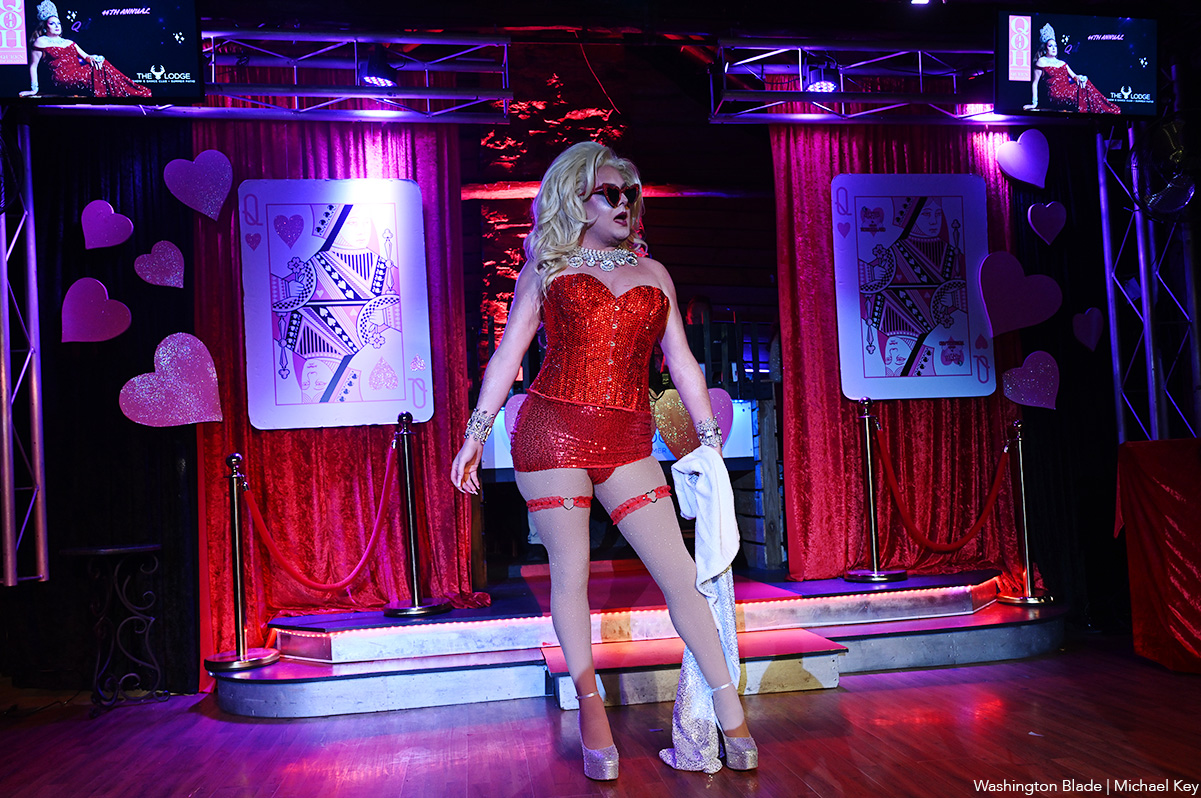
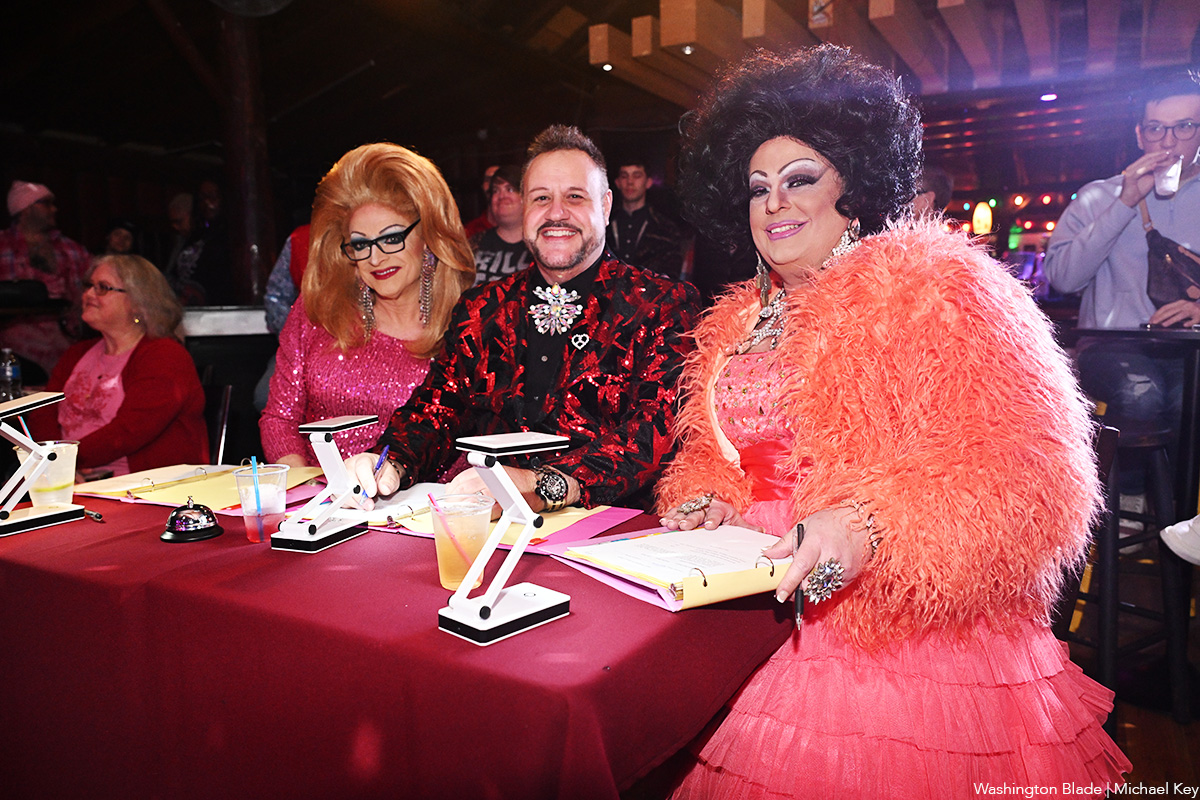
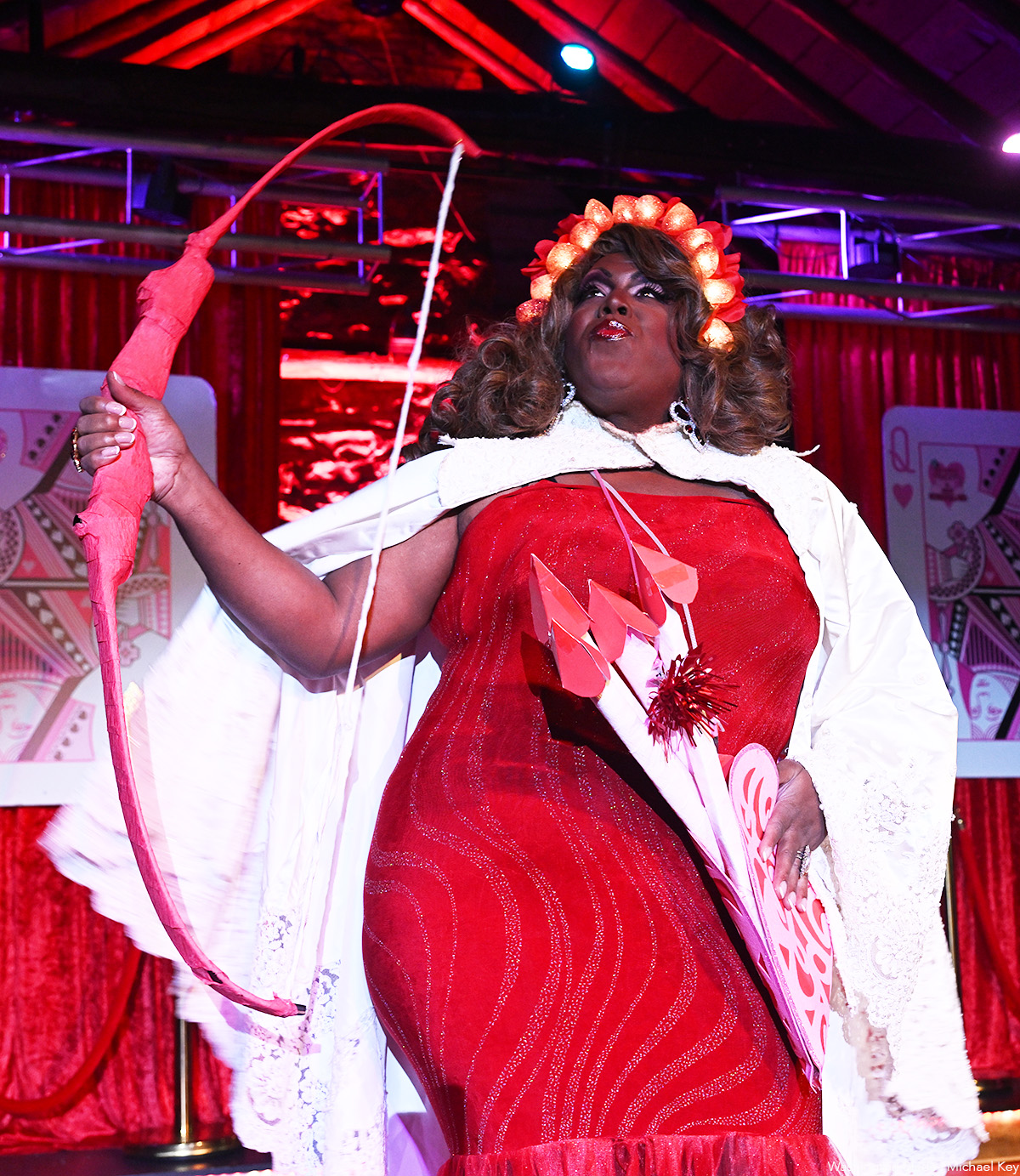
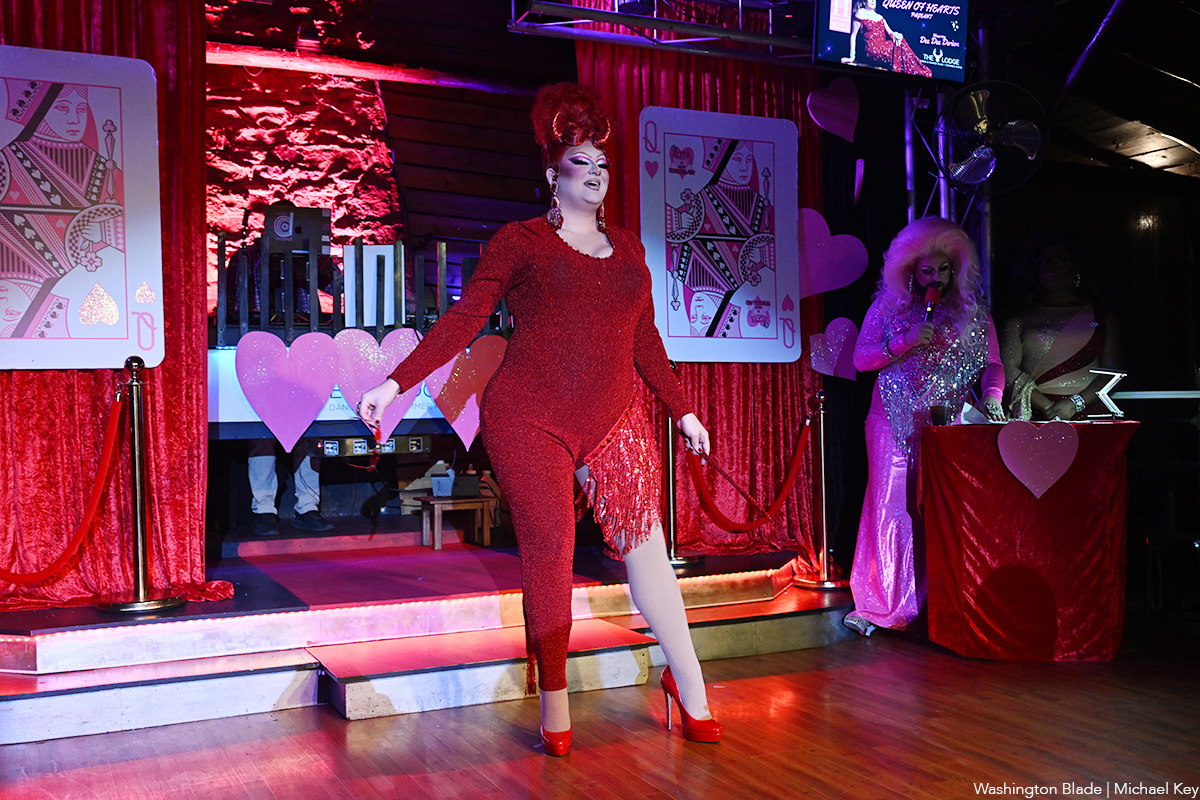
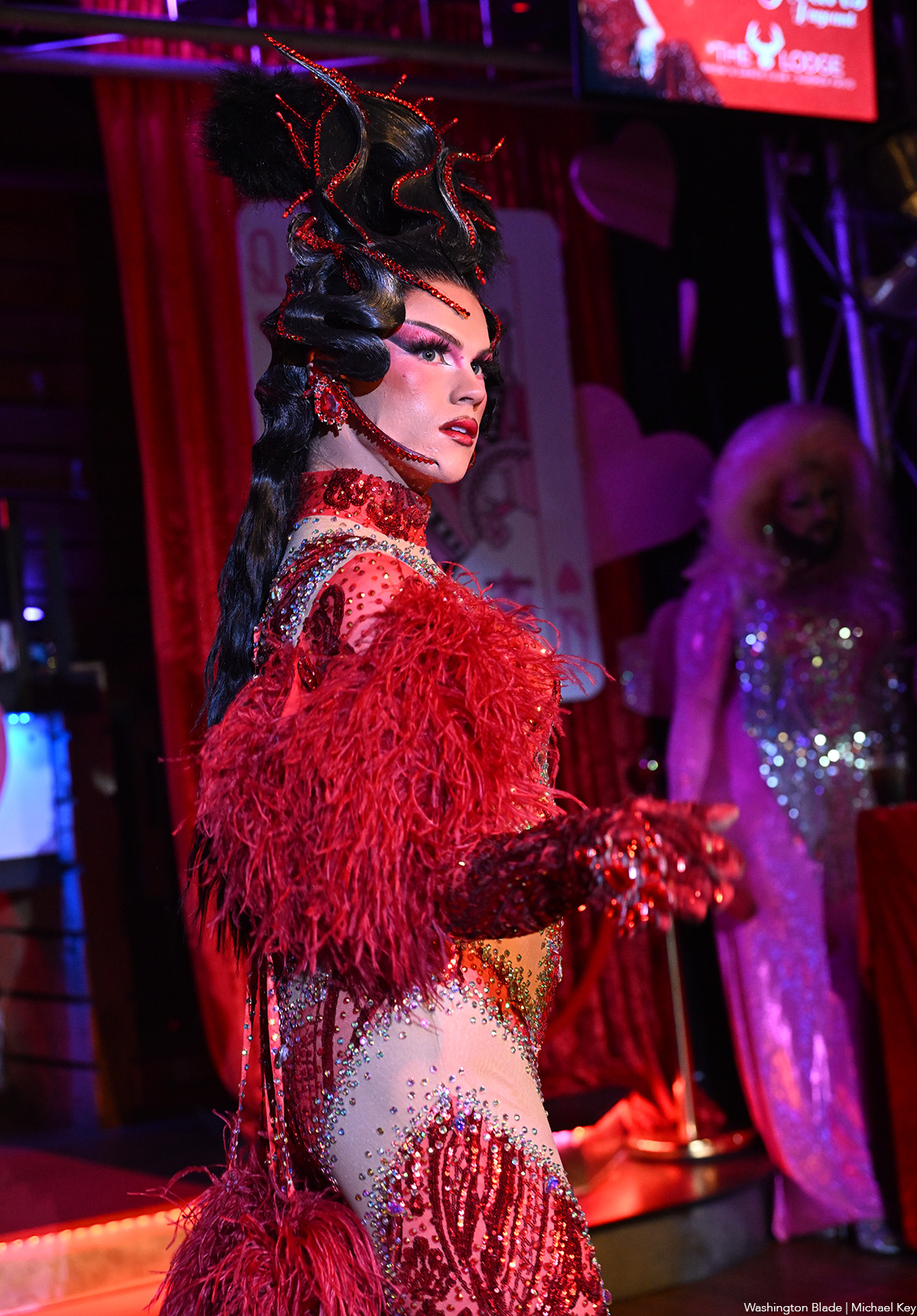
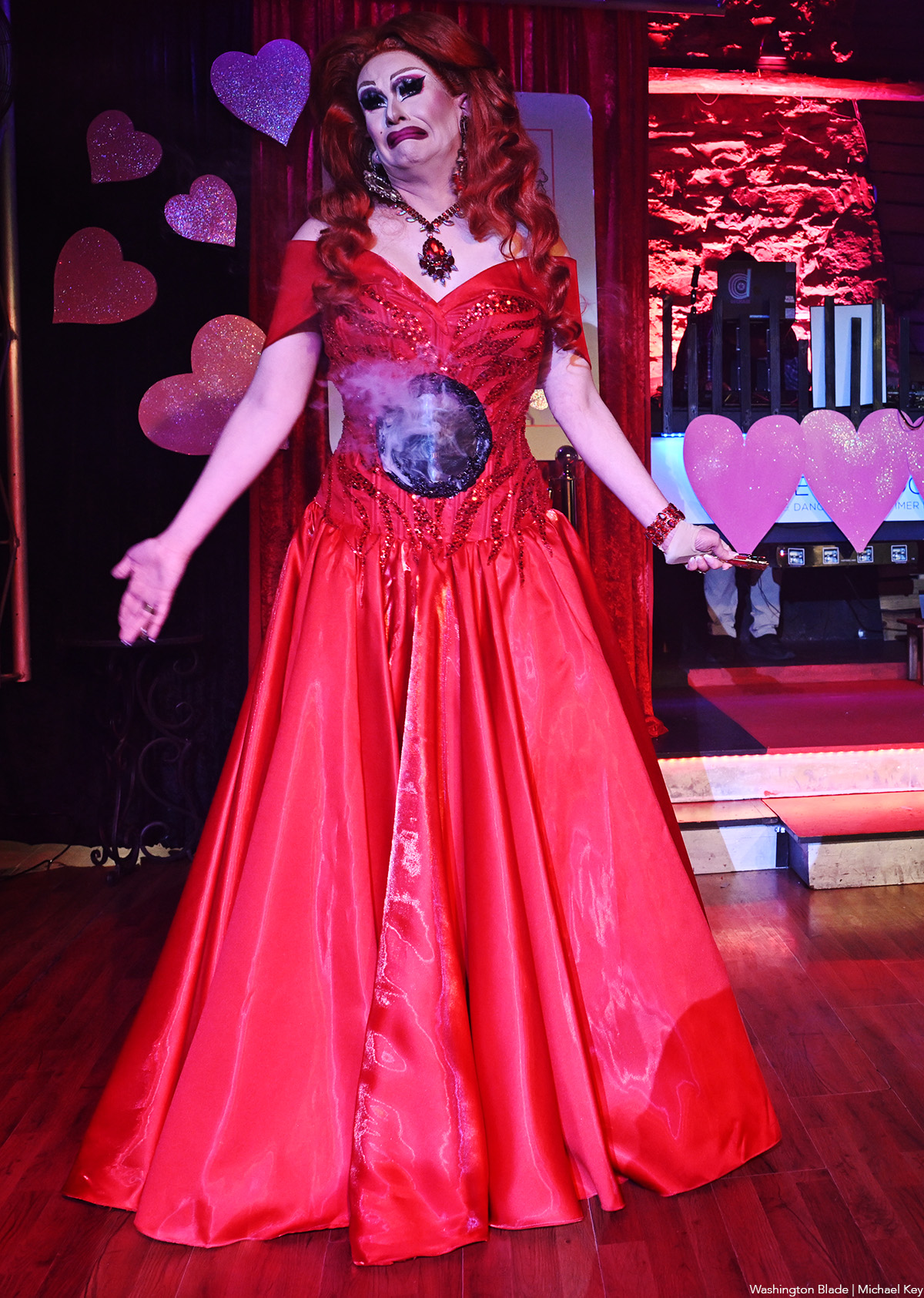
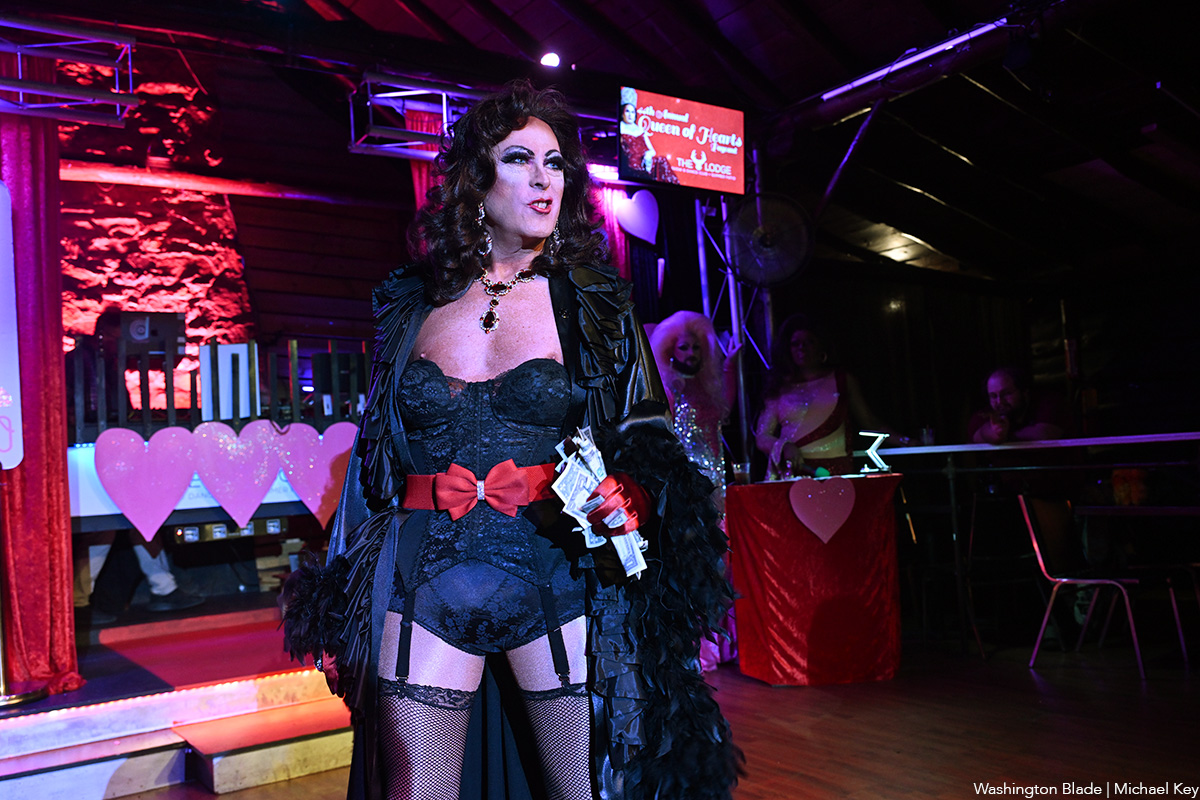
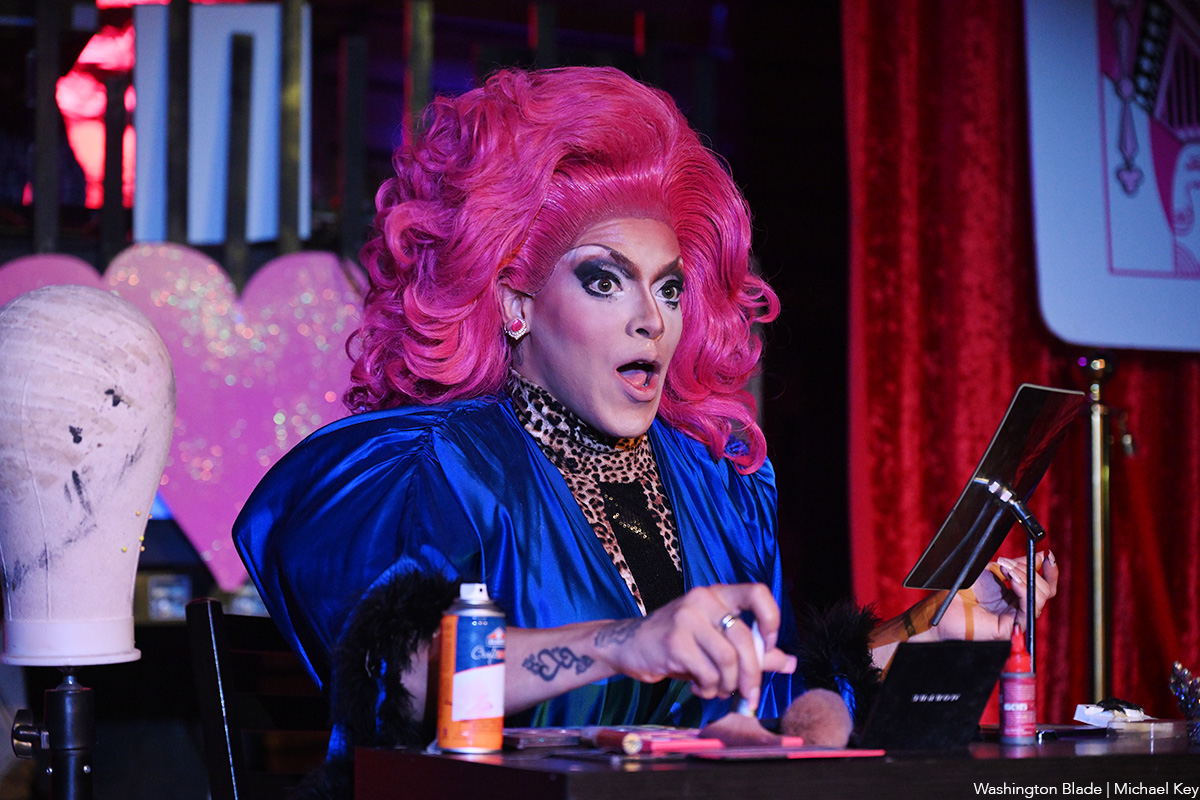
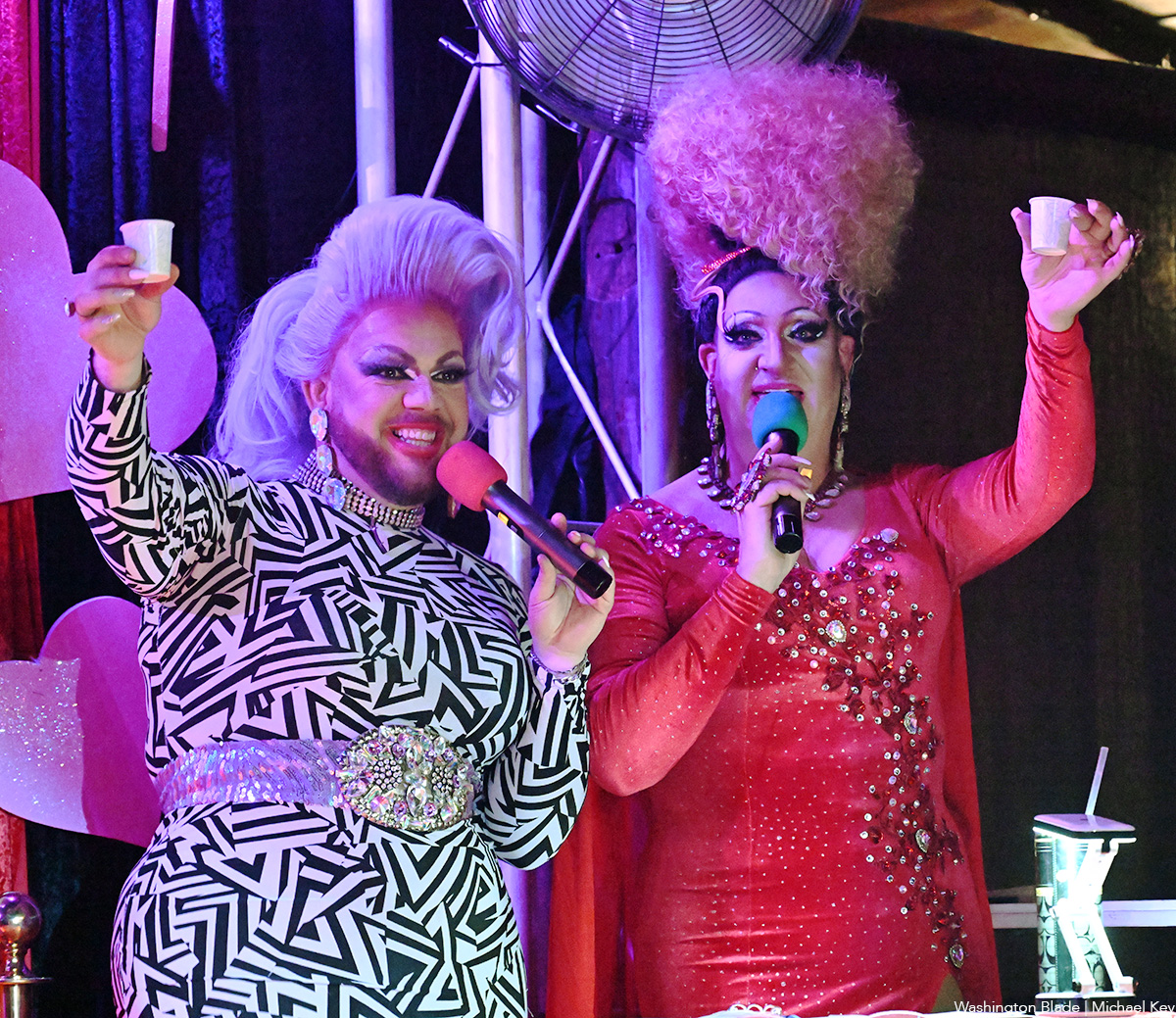
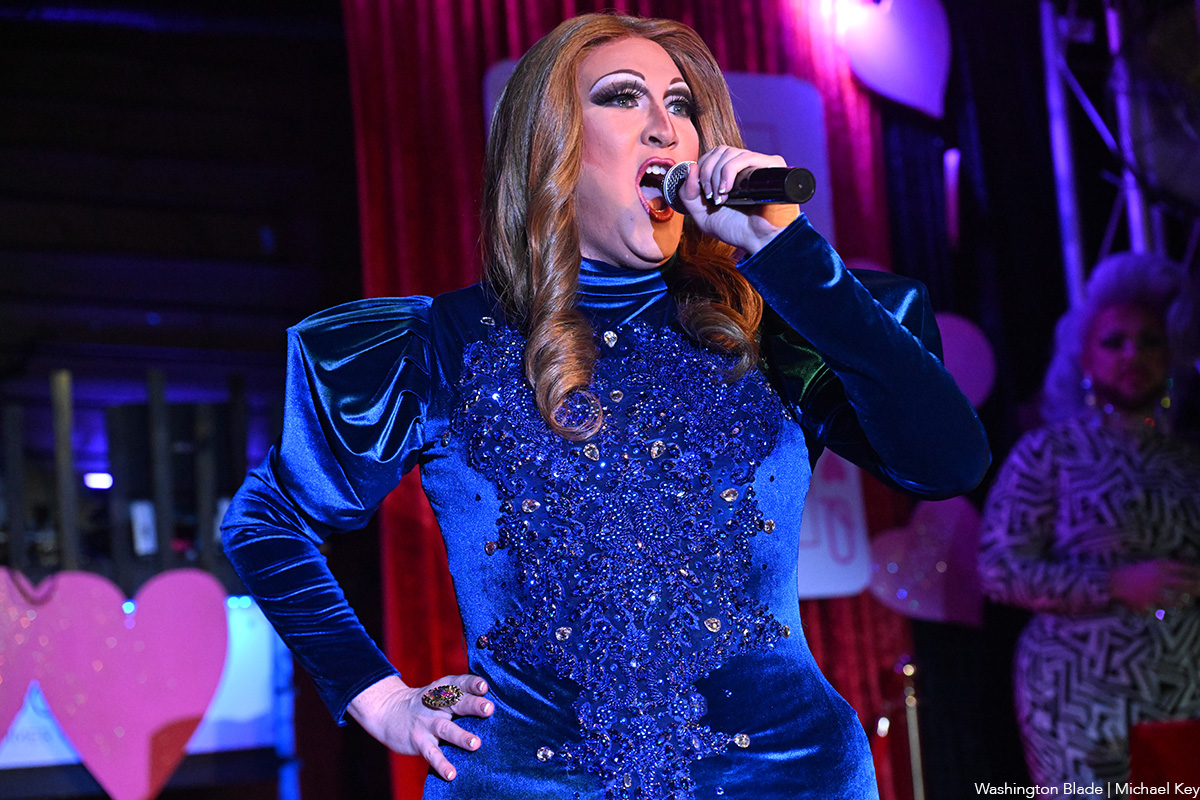
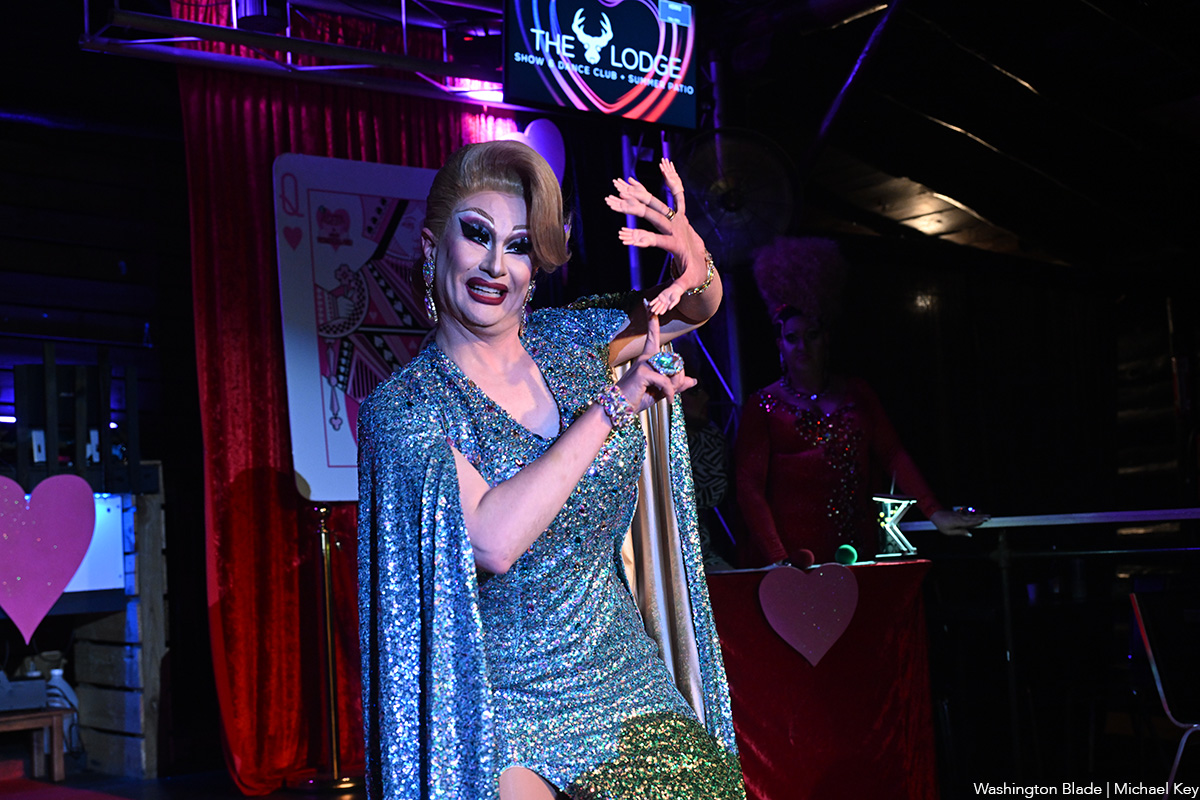
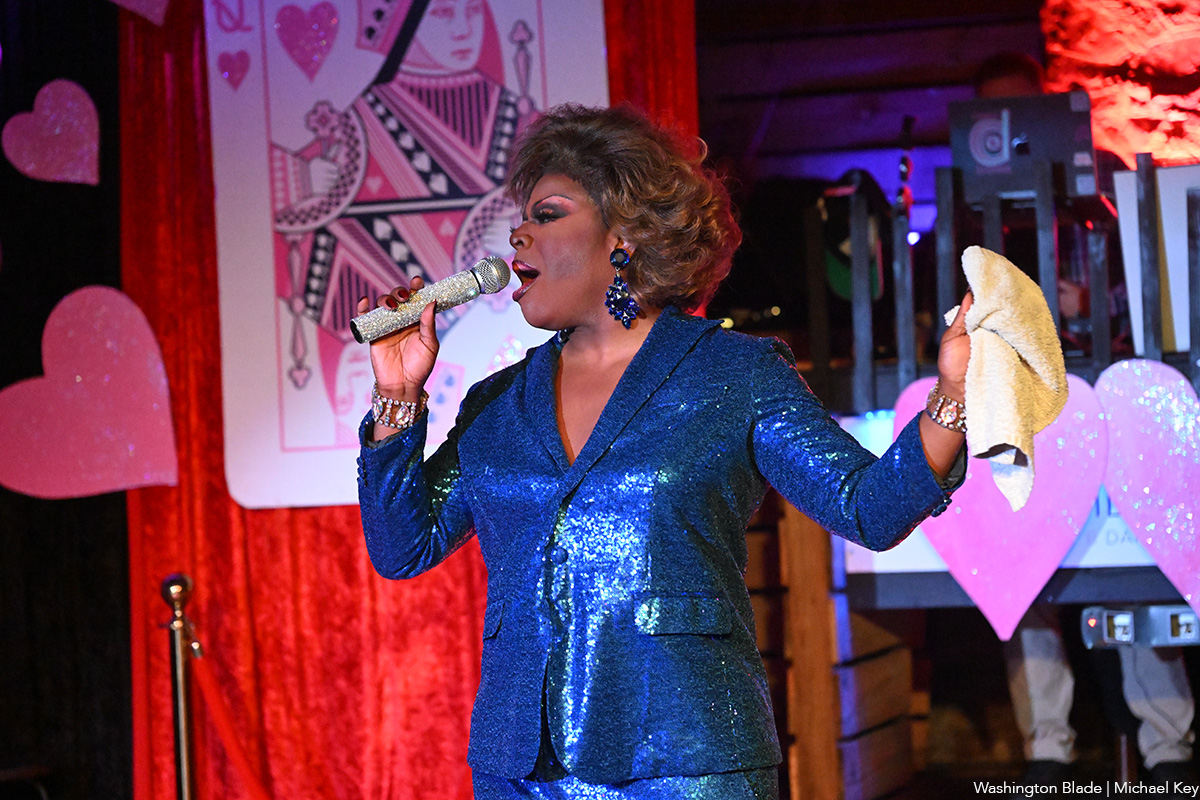
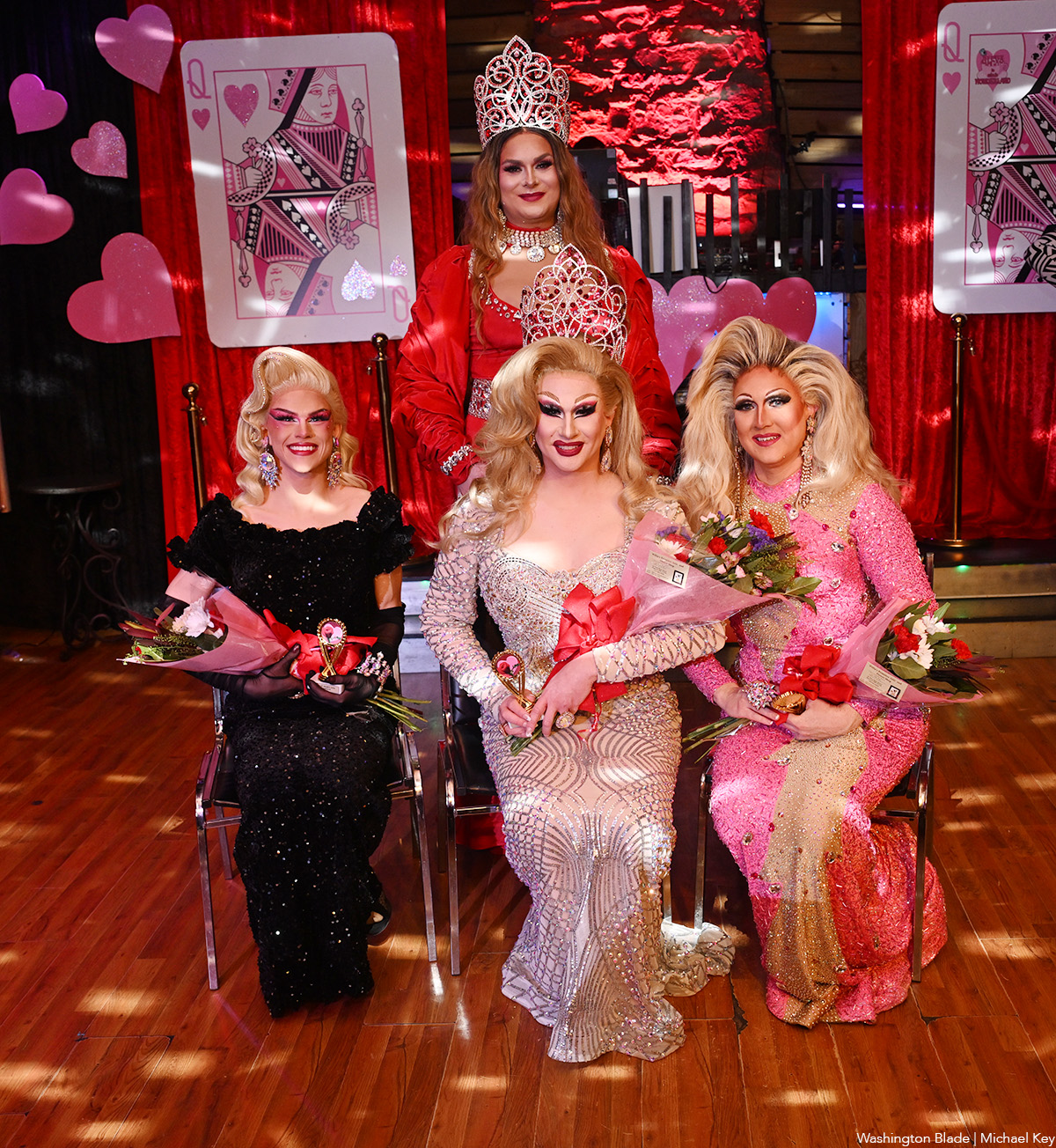
View on Threads
Books
New book profiles LGBTQ Ukrainians, documents war experiences
Tuesday marks four years since Russia attacked Ukraine

Journalist J. Lester Feder’s new book profiles LGBTQ Ukrainians and their experiences during Russia’s war against their country.
Feder for “The Queer Face of War: Portraits and Stories from Ukraine” interviewed and photographed LGBTQ Ukrainians in Kyiv, the country’s capital, and in other cities. They include Olena Hloba, the co-founder of Tergo, a support group for parents and friends of LGBTQ Ukrainians, who fled her home in the Kyiv suburb of Bucha shortly after Russia launched its war on Feb. 24, 2022.
Russian soldiers killed civilians as they withdrew from Bucha. Videos and photographs that emerged from the Kyiv suburb showed dead bodies with their hands tied behind their back and other signs of torture.

Olena Shevchenko, chair of Insight, a Ukrainian LGBTQ rights group, wrote the book’s forward.

The book also profiles Viktor Pylypenko, a gay man who the Ukrainian military assigned to the 72nd Mechanized Black Cossack Brigade after the war began. Feder writes Pylypenko’s unit “was deployed to some of the fiercest and most important battles of the war.”
“The brigade was pivotal to beating Russian forces back from Kyiv in their initial attempt to take the capital, helping them liberate territory near Kharkiv and defending the front lines in Donbas,” wrote Feder.
Pylypenko spent two years fighting “on Ukraine’s most dangerous battlefields, serving primarily as a medic.”
“At times he felt he was living in a horror movie, watching tank shells tear his fellow soldiers apart before his eyes,” wrote Feder. “He held many men as they took their final breaths. Of the roughly one hundred who entered the unit with him, only six remained when he was discharged in 2024. He didn’t leave by choice: he went home to take care of his father, who had suffered a stroke.”
Feder notes one of Pylypenko’s former commanders attacked him online when he came out. Pylypenko said another commander defended him.
Feder also profiled Diana and Oleksii Polukhin, two residents of Kherson, a port city in southern Ukraine that is near the mouth of the Dnieper River.
Ukrainian forces regained control of Kherson in November 2022, nine months after Russia occupied it.
Diana, a cigarette vender, and Polukhin told Feder that Russian forces demanded they disclose the names of other LGBTQ Ukrainians in Kherson. Russian forces also tortured Diana and Polukhin while in their custody.
Polukhim is the first LGBTQ victim of Russian persecution to report their case to Ukrainian prosecutors.

Feder, who is of Ukrainian descent, first visited Ukraine in 2013 when he wrote for BuzzFeed.
He was Outright International’s Senior Fellow for Emergency Research from 2021-2023. Feder last traveled to Ukraine in December 2024.
Feder spoke about his book at Politics and Prose at the Wharf in Southwest D.C. on Feb. 6. The Washington Blade spoke with Feder on Feb. 20.
Feder told the Blade he began to work on the book when he was at Outright International and working with humanitarian groups on how to better serve LGBTQ Ukrainians. Feder said military service requirements, a lack of access to hormone therapy and documents that accurately reflect a person’s gender identity and LGBTQ-friendly shelters are among the myriad challenges that LGBTQ Ukrainians have faced since the war began.
“All of these were components of a queer experience of war that was not well documented, and we had never seen in one place, especially with photos,” he told the Blade. “I felt really called to do that, not only because of what was happening in Ukraine, but also as a way to bring to the surface issues that we’d had seen in Iraq and Syria and Afghanistan.”

Feder also spoke with the Blade about the war’s geopolitical implications.
Russian President Vladimir Putin in 2013 signed a law that bans the “promotion of homosexuality” to minors.
The 2014 Winter Olympics took place in Sochi, a Russian resort city on the Black Sea. Russia annexed Crimea from Ukraine a few weeks after the games ended.
Russia’s anti-LGBTQ crackdown has continued over the last decade.
The Russian Supreme Court in 2023 ruled the “international LGBT movement” is an extremist organization and banned it. The Russian Justice Ministry last month designated ILGA World, a global LGBTQ and intersex rights group, as an “undesirable” organization.
Ukraine, meanwhile, has sought to align itself with Europe.
Ukrainian President Volodymyr Zelenskyy after a 2021 meeting with then-President Joe Biden at the White House said his country would continue to fight discrimination based on sexual orientation and gender identity. (Zelenskyy’s relationship with the U.S. has grown more tense since the Trump-Vance administration took office.) Zelenskyy in 2022 publicly backed civil partnerships for same-sex couples.
Then-Ukrainian Ambassador to the U.S. Oksana Markarova in 2023 applauded Kyiv Pride and other LGBTQ and intersex rights groups in her country when she spoke at a photo exhibit at Ukraine House in D.C. that highlighted LGBTQ and intersex soldiers. Then-Kyiv Pride Executive Director Lenny Emson, who Feder profiles in his book, was among those who attended the event.
“Thank you for everything you do in Kyiv, and thank you for everything that you do in order to fight the discrimination that still is somewhere in Ukraine,” said Markarova. “Not everything is perfect yet, but you know, I think we are moving in the right direction. And we together will not only fight the external enemy, but also will see equality.”
Feder in response to the Blade’s question about why he decided to write his book said he “didn’t feel” the “significance of Russia’s war against Ukraine” for LGBTQ people around the world “was fully understood.”
“This was an opportunity to tell that big story,” he said.
“The crackdown on LGBT rights inside Russia was essentially a laboratory for a strategy of attacking democratic values by attacking queer rights and it was one as Ukraine was getting closet to Europe back in 2013, 2014,” he added. “It was a strategy they were using as part of their foreign policy, and it was one they were using not only in Ukraine over the past decade, but around the world.”
Feder said Republicans are using “that same strategy to attack queer people, to attack democracy itself.”
“I felt like it was important that Americans understand that history,” he said.

More than a dozen LGBTQ athletes won medals at the Milan Cortina Winter Olympics that ended on Sunday.
Cayla Barnes, Hilary Knight, and Alex Carpenter are LGBTQ members of the U.S. women’s hockey team that won a gold medal after they defeated Canada in overtime. Knight the day before the Feb. 19 match proposed to her girlfriend, Brittany Bowe, an Olympic speed skater.
French ice dancer Guillaume Cizeron, who is gay, and his partner Laurence Fournier Beaudry won gold. American alpine skier Breezy Johnson, who is bisexual, won gold in the women’s downhill. Amber Glenn, who identifies as bisexual and pansexual, was part of the American figure skating team that won gold in the team event.
Swiss freestyle skier Mathilde Gremaud, who is in a relationship with Vali Höll, an Austrian mountain biker, won gold in women’s freeski slopestyle.
Bruce Mouat, who is the captain of the British curling team that won a silver medal, is gay. Six members of the Canadian women’s hockey team — Emily Clark, Erin Ambrose, Emerance Maschmeyer, Brianne Jenner, Laura Stacey, and Marie-Philip Poulin — that won silver are LGBTQ.
Swedish freestyle skier Sandra Naeslund, who is a lesbian, won a bronze medal in ski cross.
Belgian speed skater Tineke den Dulk, who is bisexual, was part of her country’s mixed 2000-meter relay that won bronze. Canadian ice dancer Paul Poirier, who is gay, and his partner, Piper Gilles, won bronze.
Laura Zimmermann, who is queer, is a member of the Swiss women’s hockey team that won bronze when they defeated Sweden.
Outsports.com notes all of the LGBTQ Olympians who competed at the games and who medaled.



















